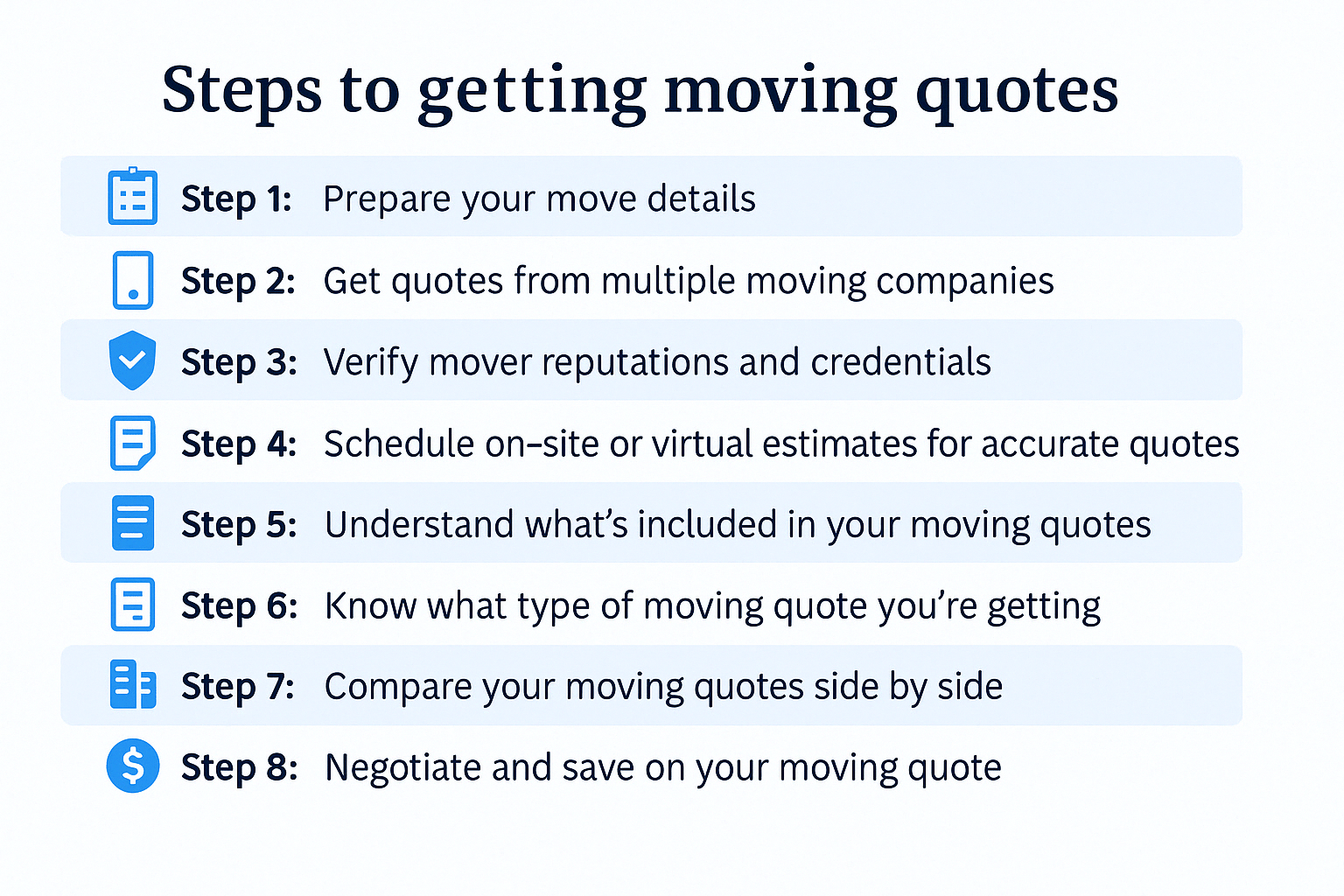Moving Cost Calculator
Use moveBuddha’s free moving cost calculator to estimate how much your move will cost. You’ll get an instant moving estimate without putting in your email or other personal information. Plus, find helpful tips to save on your next move.
Your move is important to us because it’s important to you. We only recommend moving companies that are properly licensed and insured and meet our set of rigorous review standards. Read our full Moving Company Methodology. We take all reasonable measures to protect your personal data and maintain security. Read our Privacy Policy.







Our track record










How Much Do Movers Cost?
On average, it costs $340 to $14,000+ to move, based on our 2025 cost data.
We know that’s a wide range, but several factors go into moving costs. The biggest one is whether you choose a DIY move or a full-service one.
- Professional movers: Local moves typically cost between $455 and $3,000, while long-distance moves can range from $1,000 to $14,000+.
- Moving containers: Expect to pay between $400 and $700 for local moves, and $900 to $4,500 for long-distance container services.
- Rental trucks: Local truck rentals usually cost between $30 and $500, with pricing structures varying from company to company.
To get an accurate moving quote, always take these steps:
- Use a moving cost calculator to get an estimate tailored to your move details.
- Get multiple quotes from moving companies to compare pricing.
- Understand your needs: Know whether you need packing, unpacking, storage, or specialized services.
- Factor in additional costs like tolls, moving supplies, tips, and extra services.
Below are sample rates for local and long-distance moves based on different home sizes and distances.
Average cost of local moves
Full-service movers cost about $25–$100 per hour per moving crew member for local moves.
| Home Size | Avg. Total Cost | Cost/hour | # of Movers | # Hours |
|---|---|---|---|---|
| Studio | $340 | $120 | 2 movers | 3 hours |
| 1 Bedroom | $460 | $120 | 2 movers | 4 hours |
| 2 Bedroom | $725 | $170 | 3 movers | 5 hours |
| 3 Bedroom | $1,625 | $235 | 4 movers | 8 hours |
| 4 Bedroom | $1,860 | $235 | 4 movers | 9 hours |
| 5+ Bedroom | $2,850 | $330 | 5 movers | 10 hours |
Average cost of movers by state
Average cost of long-distance moves
Average long-distance moving costs can range from $1,000–$14,000+, depending on the size and distance of your move.
| Mileage | Studio/1 Bedroom | 2–3 Bedrooms | 4+ Bedrooms |
|---|---|---|---|
| 250–500 miles | $1,380–$3,085 | $2,778–$4,669 | $3,088–$6,545 |
| 1,000 miles | $2,152–$4,643 | $3,244–$5,689 | $3,906–$7,671 |
| 2,500+ miles | $2,425–$4,967 | $4,940–$7,279 | $6,299–$11,266 |
Average cost of DIY moves
The average cost of a DIY move can vary depending on whether you book a moving container or rental truck, how much stuff you have to move, and how far you’re going.
Let’s look at the cost of moving containers and moving trucks.
- Moving container cost: The average cost to move within 50 miles with portable moving container companies is around $400–$700 for one container. For interstate moves, average moving container costs range from $900–$4,500 or more.
- Moving truck rental cost: The average price for a local moving truck rental ranges from $30–$500, depending on the size of the truck and duration of the rental. For instance, Budget Truck Rental charges $20–$60 per day (plus a per-mile fee) as their base rate for local moves.
Average city-to-city moving cost estimates
Based on moveBuddha’s proprietary 2025 moving cost data, here’s what you can expect to pay to move from different cities across the US. These ranges reflect accurate estimates for rental trucks, containers, and professional movers from our up-to-date cost guides.
Short-distance moves
| Route | Rental Truck | Moving Container | Full-Service Movers |
|---|---|---|---|
| New York City → Boston | $301 – $738 | $652 – $2,781 | $864 – $5,885 |
| Los Angeles → San Diego | $162 – $340 | $579 – $2,475 | $679 – $5,320 |
| Atlanta → Charlotte | $352 – $871 | $737 – $3,214 | $1,012 – $7,206 |
Medium-distance moves
| Route | Rental Truck | Moving Container | Full-Service Movers |
|---|---|---|---|
| Dallas → Denver | $695 – $1,903 | $897 – $4,353 | $1,397 – $9,415 |
| Chicago → Charlotte | $654 – $1,858 | $933 – $4,044 | $1,408 – $9,043 |
| New York City → Nashville | $755 – $2,067 | $955 – $4,352 | $1,329 – $8,828 |
Long-distance moves
| Route | Rental Truck | Moving Container | Full-Service Movers |
|---|---|---|---|
| Los Angeles → Dallas | $1,027 – $2,889 | $1,205 – $5,580 | $1,445 – $11,344 |
| Philadelphia → Austin | $1,219 – $3,506 | $1,219 – $6,497 | $1,470 – $11,486 |
| Seattle → Phoenix | $1,076 – $2,991 | $1,219 – $5,751 | $1,644 – $12,558 |
How are moving costs calculated?
Our free moving cost calculator considers the same factors that professional moving companies use to provide a quote, including:
- Move size: Larger moves are more expensive, as they require more labor and a larger moving truck.
- Distance: The greater the distance, the higher your moving quotes will be.
- DIY vs. professional movers: Moving containers or rental trucks are usually cheaper than professional movers, but you do the packing and heavy lifting.
- Time of year: Summer prices are higher because it’s peak moving season. The cheapest time to move is between October and April.
- Moving date: Moving prices are higher on weekends and at the beginning and end of the month.
Average moving cost by house size
Additional moving costs
Full-service movers may charge additional fees based on the details of your move:
- Specialty items: Pianos, pool tables, hot tubs, motorcycles, safes, and other bulky items will increase your cost.
- Packing supplies: Movers may charge extra if they use supplies like bubble wrap, mattress covers, or packing paper, or they’ll sell them to you directly.
- Additional services: You can pay a full-service mover for added services such as packing and unpacking and furniture assembly.
- Long-carry, stair-carry, shuttle, or elevator fees: If the mover can’t park within 100-150 feet of your door, has to use o smaller truck to get close, or navigate tricky staircases or elevators, they may charge fees.
- Storage: Many movers provide 30 days of free storage, with additional storage for a fee.
- Extra stops: Movers will typically charge a fee for additional stops beyond the primary residence.
- Expedited delivery: For an additional cost, movers will expedite your delivery and have your items delivered by a specific date.
How to lower your moving costs
There are a lot of ways to save money when moving. Here are some of our favorites:
- Sell, donate, or trash. The less you move, the less you’ll pay. Sell, donate, or trash anything that isn’t worth moving.
- Be flexible. Avoid moving around holidays, near the end of the month, or in the summer months. Having flexible moving dates can also result in a better price.
- Get multiple moving quotes. It’s not unusual for moving estimates to vary by thousands of dollars. Get at least three moving quotes for a fair price.
- Book early. When possible, book your mover 30 to 60 days in advance. Full-service movers may increase prices for last-minute bookings or have limited availability.
- Ask for price matching and discounts. Don’t hesitate to ask for a price match if you’ve found a cheaper quote elsewhere, or inquire about discounts.
- Get free packing supplies. Use our guide to find free moving boxes and other supplies.
- Use your insurance. See if your homeowners or renters insurance covers moving to avoid paying for full-valuation coverage.
Professional movers vs. DIY moves
One of the biggest decisions you’ll make is whether to move yourself or hire professionals.
- Professional movers pack, load, transport, and unload everything for you. It’s more expensive, but it’s ideal for long-distance or full-service moves where time and convenience matter most.
- DIY moves with a rental truck or moving container are more affordable, but you’ll handle all the packing, heavy lifting, and logistics yourself.
Whichever route you choose, knowing how many boxes you’ll need is key to avoiding last-minute stress or overspending on supplies. Use our free moving box calculator to get a custom list based on your home size, how many people are packing, and your packing style.
How to use our moving cost calculator
By following these steps, you can easily plan and budget for your move. You’ll have moving quotes in less than 30 seconds, and since we don’t require any personal information, you won’t be bombarded with follow-up emails or calls.
Here are five simple steps to using our moving cost calculator:
- Select your origin and destination. In the “Where are you moving from?” and “Where are you moving to?” fields, enter the ZIP codes or city names you’re moving to and from.
- Choose your move size. Select the option that best describes the size of your move, from “A few items” up to a “5+ bedroom residence.”
- Pick your moving date. Use the dropdown calendar to lock in your anticipated moving date.
- Review your estimates. Once you enter the details above, the calculator will provide estimates for professional, container, freight, and rental truck moves.
- Compare your options. Review the estimated costs of each moving method, view services, and get quotes from different movers.
How a moving cost calculator can help you
A moving cost calculator is a simple tool that can help you with key moving decisions, from choosing a mover to anticipating costs.
Here’s how a moving cost calculator can help you make your move smarter and less stressful:
- Compare moving methods: See estimated costs for full-service movers, containers, freight trailers, and rental trucks side by side.
- Estimate your budget quickly: Get solid moving quotes in seconds so you know what to expect before reaching out to movers.
- Understand what drives the price: See how factors like the size of your home, the distance of your move, and the services you choose can affect the cost.
- Avoid spam and sales calls: There’s no need to enter personal info to get moving quotes. You can get ballpark estimates here first.
- Choose the best moving company: Not sure which mover fits your situation? Our moving cost calculator can help you compare long distance movers and choose the right one.
- Make informed decisions faster: Get clear estimates without delays so you can start comparing options and planning your move right away.
Steps to get moving quotes

- Prepare your move details. Gather key info like inventory, move dates, locations, and any extra services to get accurate moving quotes.
- Get quotes from multiple moving companies. Compare at least three to five moving quotes to evaluate pricing and service options.
- Verify mover reputations and credentials. Check licensing, insurance, and reviews to avoid scams or poor service.
- Schedule on-site or virtual estimates. A walk-through—either in person or via video—helps ensure an accurate quote.
- Understand what’s included in your moving quotes. Review services, fees, move details, and insurance to avoid surprise charges.
- Know what type of quote you’re getting. Binding, non-binding, and not-to-exceed quotes each come with different rules.
- Compare quotes side by side. Look beyond the price to assess service levels, reputation, and potential red flags.
- Negotiate and look for savings. Ask about discounts, price matching, or other ways to reduce costs like DIY packing.








